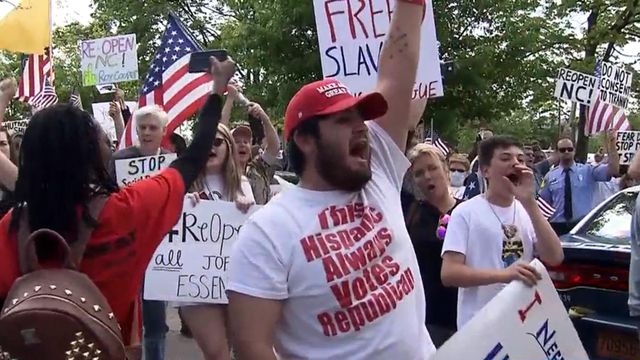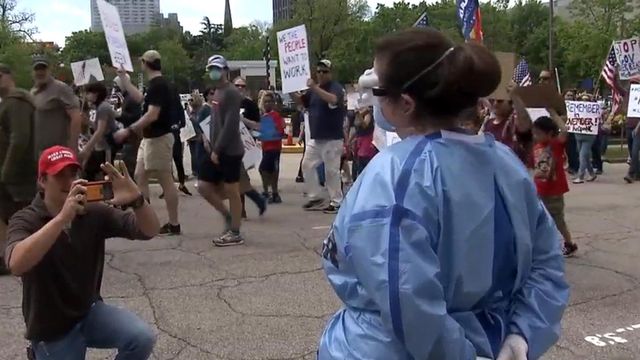'Shutdown is tyranny': Approximately 1000 march to demand Cooper reopen NC economy
Hundreds of people rallied in downtown Raleigh on Tuesday, demanding that Gov. Roy Cooper ease coronavirus-related restrictions and allow businesses to reopen during the pandemic.
Posted — UpdatedCooper's stay-at-home order went into effect March 30 and is scheduled to run to the end of April. It prohibits gatherings of more than 10 people – supermarkets and other "essential" businesses are exempt, but they must limit the number of customers inside and keep them from gathering at checkout lines – and effectively shut down businesses where customers and staff were required to be in close quarters.
Ashley Smith, co-founder of ReOpenNC, called the order unconstitutional, saying it was preventing people from pursuing their livelihoods.
"Elected officials seem to be of the belief that this health crisis gives them the power to override our precious, inalienable, God-given rights," Smith said. "These officials are wrong."
ReOpenNC started on social media a few weeks ago and now has more than 64,000 followers.
"The very moment we open up, it will increase our numbers because we've all been in the house," protester Sherry Womack said. "You can't stay in your house forever."
Police estimated that about 1,000 people took part in the rally. They marched through downtown, past the governor's mansion and the Legislative Building, waving American flags and signs such as "Shutdown is tyranny," "End the virus, not the economy" and "Roy Cooper is not essential."
"Who gets to decide who is essential and who’s not essential? Which children’s parents are essential to earn a living for their kids?" one man asked.
"The government needs to know what they're doing to us," one woman marcher said. "We have lost our business because of this, and we can't depend on the government forever. ... We're all going to be in poverty because we cannot work. We can work with precautions. We cannot just hide."
"This isn't a political statement – it isn't for me. This is about our right to get back to work and our right to freedom of speech," marcher Jason Pipes said. "The majority of people here just want to get back to work."
Some health care workers lined portions of the march route in a silent counter-protest, saying reopening the economy too quickly could put more people at risk from the virus.
"The longer this activity goes on, the longer it puts me and my co-workers and our families at risk," said nurse Anne-Marie Somerville, who was dressed in surgical scrubs.
"I fear a second wave. I fear a third wave when flu season comes in the fall," nurse Whitney Lafleur said. "What I fear the most is loved ones [and], co-workers becoming ill, which they already have, but to a greater extent."
"Coming up to us and waving Trump signs and cursing at us doesn't do anybody any good," pharmacist Nicholas Blanchard said of tensions between the two sides of the debate. "I'm very concerned, and we could possibly have a spike because of this, of coronavirus cases."
Tina Gordon, chief executive of the North Carolina Nurses Association, called reopening too soon "counterproductive."
"The last thing we want is to open up too soon, see another spike in cases and have to reissue another stay-at-home order. That would put us right back where we are today or worse, with even more preventable deaths and likely a greater negative impact on the economy," Gordon said in a statement.
Yet, Smith jabbed at Cooper in a news conference, saying, "To suppress those rights of the citizens of this great state is both a dereliction of your duties and a contradiction to the very oath of office you swore to uphold as governor."
Cooper sidestepped any comment on the protest when asked about it at the state's daily pandemic briefing on Tuesday afternoon.
"We are working to ease restrictions in a responsible way, in a staged way," he said, contending that the restrictions have "saved countless numbers of lives."
North Carolina has added about 2,000 virus cases in the last week, and the number of deaths statewide has doubled in the time.
Cooper has promised to ease the stay-at-home order restrictions as soon as data shows that the worst of the pandemic has passed in North Carolina and when the state has the capacity to handle extensive testing and tracing the contacts of infected individuals so new outbreaks don't surface.
"We understand that we can't stay at home forever and that this is not something that is sustainable long term. But what we have to do is to ease back into it to make sure that this virus does not spike, which it very easily could do, overwhelming our hospitals," he said. "I think most everyday North Carolinians understand that we have to approach this responsibly."
Smith said the governor's plan is "a moving goalpost," and ReOpenNC wants businesses back open by May 1.
She noted that predictions of millions of deaths and overwhelmed hospitals haven't come to pass and that data doesn't support continued restrictions in North Carolina.
"End the shutdown," she said. "The people of North Carolina can exercise their own judgment about their decisions and make their own risk assessments."
Many of the protesters went without masks, and they were often clumped in small groups, skipping the "social distancing" that public health officials say is necessary to limit the spread of the virus.
Cooper's top lawyer said Monday that the stay-at-home order doesn't infringe on people's free-speech rights and that protesters would be allowed to demonstrate as long as they maintained their distance from each other.
"People have done their best to keep their distance," Smith said of Tuesday's protest. "I've also seen the media isn't practicing social distancing, and I've also seen the police doing the same thing."
Republican 9th District Congressman Dan Bishop took part in the protest "to remind the governor that our rights don't exist by his benevolence."
"The First Amendment is not under a stay-at-home order," Bishop said, noting that a federal judge in Kansas has halted a gubernatorial order there related to gathering for religious services.
"I do have concerns about social distancing not being practiced, but everyone's entitled to their First Amendment rights," state Sen. Jay Chaudhuri, D-Wake, said as he watched the march. "I worry about not letting science and data dictate when we're going to decide to gradually reopen our economy."
State health officials need to share the data they are compiling to justify keeping the stay-at-home order in place past May 1, Bishop said. A statistical model used by Mecklenburg County officials has been "wildly erratic," he said.
The World Health Organization and other public health officials argue that the worst of the pandemic is still ahead.
“This is not the time to be lax. Instead, we need to ready ourselves for a new way of living for the foreseeable future,” said Dr. Takeshi Kasai, the WHO regional director for the Western Pacific.
On average, North Carolina is testing about 2,500 cases a day, but state health officials say more testing and data collection is needed before the state lifts the stay-at-home order. The state is also working to set up additional testing sites to target minority communities.
Some states, especially southern states, are already planning to reopen. Some businesses will open in Georgia on Friday, and South Carolina's governor wants to reopen non-essential businesses Tuesday.
• Credits
Copyright 2024 by Capitol Broadcasting Company. All rights reserved. This material may not be published, broadcast, rewritten or redistributed.






